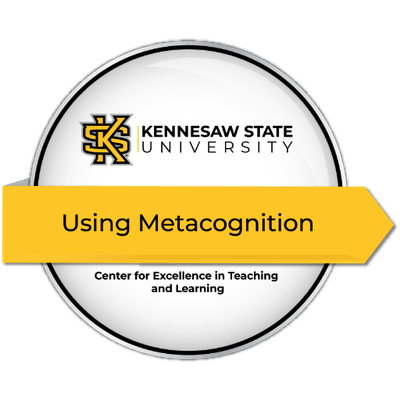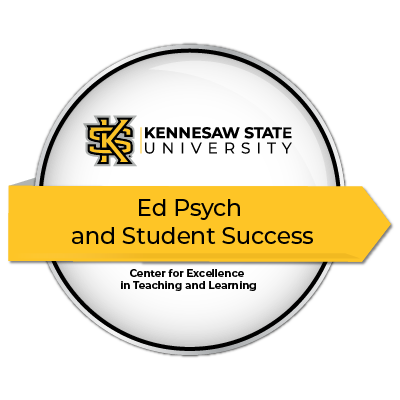Science of Learning
Many teaching recommendations are based on findings from the science of learning, which has its basis in educational and cognitive psychology. The Scholarship of Teaching and Learning (SoTL) also often draws from and is framed by key concepts in these fields, yet for teachers and researchers outside these disciplines, the search for appropriate literature can seem very time-consuming.
If you are new to this literature, the following secondary sources may be helpful as “entry points.” Scroll to the accordion list for research and meta-analyses on common topics of interest for faculty. To improve your teaching, consider introducing your students to concepts like metacognition with help from this student handout, and discover ideas for incorporating it into your teaching through this metacognition menu. For more information about how the science of learning can inform your teaching or SoTL projects, please contact Hillary Steiner, Associate Director for SoTL and Professor of Psychological Science.
Books and Articles:
- Lovett, M. C., Bridges, M. W., DiPietro, M., Ambrose, S. A., & Norman, M. K. (2023). How learning works: Eight research-based principles for smart teaching. John Wiley & Sons.
- Brown, P.C., Roediger, H.L., & McDaniel, M.A. (2014). Make it stick. Harvard University Press.
- Chew, S.L., & Cerbin, W.J. (2020).The cognitive challenges of effective teaching.The Journal of Economic Education, DOI: 10.1080/00220485.2020.1845266
- Darby, F., & Lang, J.M. (2019). Small teaching online: Applying learning science in online classes. John Wiley & Sons.
- Eyler, J.R. (2018). How humans learn: The science and stories behind effective college teaching. West Virginia University Press.
- Lang, J.M. (2021). Small teaching: Everyday lessons from the science of learning (2nd ed). John Wiley & Sons.
E-Books and Websites:
- SoTL Annotations provides a crowdsourced annotated bibliography on dozens of teaching and learning topics.
- This ebook on applying the science of learning and the ebook that followed it offer useful collections of chapters on a variety of topics.
- Improve with Metacognition offers information and commentary about using the principles of metacognition in the classroom.
- RetrievalPractice.org explains and promotes retrieval practice as a key aspect of learning.
- The Learning Scientists are a group of cognitive psychologists who share their insights on learning through blogs, books, podcasts, and downloadable materials.
- Taking Learning Seriously includes information, learning guides and teaching tools focused on translating cognitive science into practice.
- Elizabeth and Robert Bjork's Learning and Forgetting Lab at UCLA has a collection of excellent primary sources on learning, memory, metacognition, and more.
For a deeper dive into the science of learning literature, consider these recommended articles and books:
-
Learning and Studying (General)
These sources are a good place to start if you’re investigating common learning strategies and student learning behaviors.
- Janssen, E. M., van Gog, T., van de Groep, L., de Lange, A. J., Knopper, R. L., Onan, E., ... & de Bruin, A. B. (2023). The role of mental effort in students’ perceptions of the effectiveness of interleaved and blocked study strategies and their willingness to use them. Educational Psychology Review, 35(3), 85. https://link.springer.com/article/10.1007/s10648-023-09797-3
- Rea, S. D., Wang, L., Muenks, K., & Yan, V. X. (2022). Students can (mostly) recognize effective learning, so why do they not do it? Journal of Intelligence, 10(4), 127. http://dx.doi.org/10.3390/jintelligence10040127
- Dunlosky, J., Rawson, K. A., Marsh, E. J., Nathan, M. J., & Willingham, D. T. (2013). Improving students’ learning with effective learning techniques: Promising directions from cognitive and educational psychology. Psychological Science in the Public Interest, 14(1), 4-58. doi: 10.1177/1529100612453266
- Kornell, N., & Bjork, R.A. (2007). The promise and perils of self-regulated study. Psychonomic Bulletin & Review, 14, 219–224. doi: 10.3758/BF03194055
- McCabe, J. (2011). Metacognitive awareness of learning strategies in undergraduates. Memory & Cognition, 39(3), 462-476. doi: 10.3758/s13421-010-0035-2
- Entwistle, N. (2019). Contributions of educational psychology to understanding student learning: What has been discovered - what more could be done? Psychology of Education Review, 43(1), 9–19.
- Geller, J., Toftness, A. R., Armstrong, P. I., Carpenter, S. K., Manz, C. L., Coffman, C. R., & Lamm, M. H. (2018). Study strategies and beliefs about learning as a function of academic achievement and achievement goals. Memory, 26(5), 683–690. doi: 10.1080/09658211.2017.1397175
- Morehead, K., Dunlosky, J., Rawson, K. A., Blasiman, R., & Hollis, R. B. (2019). Note-taking habits of 21st century college students: implications for student learning, memory, and achievement. Memory, 27(6), 807-819. doi: 10.1080/09658211.2019.1569694
- Brady, A. C., Kulesza, A. E., Hensley, L. C., Wolters, C. A., Sovic, D. M., & Breitenberger, C. A. (2022). What Makes a Study Strategy Intervention Impactful? An Interview-Based Study. College Student Affairs Journal, 40(1), 17-31.
-
Self-Regulated Learning and Metacognition
Self-regulated learning is directed by the learner, who develops strategic goals, initiates productive learning behaviors, and reflects on the outcomes. The cognitive aspect of self-regulated learning includes metacognition, where a learner plans for, monitors, and reflects on their own learning and studying. Consider introducing students to the concept of metacognition through this student handout, and discover ideas for incorporating it into your teaching through this metacognition menu.
- Zimmerman, B.J. (1990). Self-regulated learning and academic achievement: an overview. Educational Psychologist 25, 3–17. doi: 10.1207/s15326985ep2501_2
- Bjork, R. A., Dunlosky, J., & Kornell, N. (2013). Self-regulated learning: Beliefs, techniques, and illusions. Annual Review of Psychology, 64, 417–444. doi: 10.1146/annurev-psych-113011-143823
- Schraw, G. (1998). Promoting general metacognitive awareness. Instructional Science, 26(1-2), 113-125. doi: 10.1023/A:1003044231033
- Pintrich, P. R. (2004). A conceptual framework for assessing motivation and self-regulated learning in college students. Educational Psychology Review, 16(4), 385-407. doi: 0.1007/s10648-004-0006-x
- Kuhn, D. (2000) Metacognitive Development. Current Directions in Psychological Science, 9(5),178-181. doi: 10.1111/1467-8721.00088
- Nilson, L. (2013). Creating self-regulated learners. Herndon, VA: Stylus.
-
Attention and Multitasking
Learning first requires attention, yet many things compete for our students' attention. These sources describe research on attention and multitasking.
- Andrade, J. (2010). What does doodling do? Applied Cognitive Psychology, 24, 100-106. doi: 10.1002/acp.1561
- Bantoft, C., Summers, M.J., Tranent, P.J., Palmer, M.A., Cooley, P.D. & Pedersen, S.J. (2016) Effect of standing or walking at a workstation on cognitive function: a randomized counterbalanced trial. Human Factors, 58, 140–149. doi: 10.1177/0018720815605446
- Finley, J. R., Benjamin, A. S., McCarley, J. S. (2014). Metacognition of multitasking: How well do we predict the costs of divided attention? Journal of Experimental Psychology: Applied, 20, 158–165. doi: 10.1037/xap0000010
- Ravizza, S. M., Uitvlugt, M. G., & Fenn, K. M. (2017). Logged in and zoned out: How laptop internet use relates to classroom learning. Psychological Science, 28(2), 171-180. doi: 10.1177/0956797616677314
- Wammes, J. D., Ralph, B. C., Mills, C., Bosch, N., Duncan, T. L., & Smilek, D. (2019). Disengagement during lectures: Media multitasking and mind wandering in university classrooms. Computers & Education, 132, 76-89. doi: 10.1016/j.compedu.2018.12.007
-
Learning from Mistakes and Failure
Evidence suggests that intentionally embedding challenges and ill-defined problems into the curriculum can increase student learning, even when students fail to solve those problems. These articles lend credence to the axiom “making mistakes is part of learning.”
- Kapur, M. (2016). Examining productive failure, productive success, unproductive failure, and unproductive success in learning. Educational Psychologist, 51(2), 289–299. doi: 10.1080/00461520.2016.1155457
- Loibl, K. & Leuders, T. (2019). How to make failure productive: Fostering learning from errors through elaboration prompts. Learning and Instruction, 62, 1-10. doi: 10.1016/j.learninstruc.2019.03.002
- Bjork, E. L., & Bjork, R. A. (2011). Making things hard on yourself, but in a good way: Creating desirable difficulties to enhance learning. Psychology and the Real World: Essays Illustrating Fundamental Contributions to Society, 2, 59-68.
- Henry, M.A., Shorter, S., Charkoudian, L., Heemstra, J.M., & Corwin, L.A. (2019). FAIL is not a four-letter word: A theoretical framework for exploring undergraduate students’ approaches to academic challenges and responses to failure in STEM learning. CBE-Life Sciences Education, 18(1), 1–17. doi: 10.1187/cbe.18-06-0108
-
Retrieval Practice, Self-Quizzing and Learning-by-TeachingPracticing retrieving information from memory, whether through frequent low-stakes quizzing, student self-quizzing, teaching a friend, or another means, has been found to increase performance on assessments, especially when separated into several sessions. See these articles from the cognitive psychology literature:
- Bozeman, R., Mallett, R. K., Mitchell, L., & Tindale, R. S. (2024). May we take the test as a group? Examining group processes and member learning in a collaborative testing environment. Active Learning in Higher Education, 25(3), 439-454. https://doi.org/10.1177/14697874231163340
- Sotola, L. K., & Crede, M. (2021). Regarding class quizzes: A meta-analytic synthesis of studies on the relationship between frequent low-stakes testing and class performance. Educational Psychology Review, 33, 407-426.
- Karpicke, J. D. (2012). Retrieval-based learning: Active retrieval promotes meaningful learning. Current Directions in Psychological Science, 21,157–163. doi: 10.1177/0963721412443552
- Rawson, K., Dunlosky, J., & Sciartelli, S. (2013). The power of successive relearning: improving performance on course exams and long-term retention. Educational Psychology Review, 25(4), 523-548. doi: 10.1007/s10648-013-9240-4
- Koh, A. W. L., Lee, S. C., & Lim, S. W. H. (2018). The learning benefits of teaching: A retrieval practice hypothesis. Applied Cognitive Psychology, 32(3), 401-410. doi: 10.1002/acp.3410
- Fiorella, L., & Mayer, R. E. (2013). The relative benefits of learning by teaching and teaching expectancy. Contemporary Educational Psychology, 38(4), 281-288. doi: 10.1016/j.cedpsych.2013.06.001
- Szpunar, K. K., Khan, N. Y., & Schacter, D. L. (2013). Interpolated memory tests reduce mind wandering and improve learning of online lectures. Proceedings of the National Academy of Sciences, 110(16), 6313-6317. doi: 10.1073/pnas.1221764110
- Karpicke, J. D., & Smith, M. A. (2012). Separate mnemonic effects of retrieval practice and elaborative encoding. Journal of Memory and Language, 67, 17–29. doi: 10.1016/j.jml.2012.02.004
- Kornell, N., Hays, M. J., & Bjork, R. A. (2009). Unsuccessful retrieval attempts enhance subsequent learning. Journal of Experimental Psychology: Learning, Memory, and Cognition, 35(4), 989–998. doi: 10.1037/a0015729
- Blunt, J. R., & Karpicke, J. D. (2014). Learning with retrieval-based concept mapping. Journal of Educational Psychology, 106(3), 849. doi: 10.1037/a0035934
-
Mindset and MotivationMotivation is a complex concept, but many behaviors and cognitive processes associated with the motivation to learn can themselves be learned. To read more about motivation research see:
- Fong, C. J., Altan, S., Gonzales, C., Kirmizi, M., Adelugba, S. F., & Kim, Y.-E. (2024). Stay motivated and carry on: A meta-analytic investigation of motivational regulation strategies and academic achievement, motivation, and self-regulation correlates. Journal of Educational Psychology. Advance online publication. https://dx.doi.org/10.1037/edu000886
- Pintrich, P.R. (2004). A conceptual framework for assessing motivation and self-regulated learning in college students. Educational Psychology Review 16, 385–407 (2004). doi: 10.1007/s10648-004-0006-x
- Weiner, B. (2010). The development of an attribution-based theory of motivation: A history of ideas. Educational Psychologist, 45(1), 28-36. doi: 10.1080/00461520903433596
- Vallerand, R. J. (2000). Deci and Ryan's self-determination theory: A view from the hierarchical model of intrinsic and extrinsic motivation. Psychological Inquiry, 11(4), 312-318.
- Lazowski, R.A. & Hulleman, C. (2016). Motivation interventions in education: A meta-analytic review. Review of Educational Research, 86(2), 602. doi: 10.3102/0034654315617832
- Dweck, C. S. (2008). Mindset: The new psychology of success. Random House Digital, Inc..
- Chen, P., Powers, J. T., Katragadda, K. R., Cohen, G. L., & Dweck, C. S. (2020). A strategic mindset: An orientation toward strategic behavior during goal pursuit. Proceedings of the National Academy of Sciences 117(25),14066-14072. doi: 10.1073/pnas.2002529117
- Duane F., S., & Jenefer, H. (2008). Control, motivation, affect, and strategic self-regulation in the college classroom: A multidimensional phenomenon. Journal of Educational Psychology, 100(2), 443–459. doi: 10.1037/0022-0663.100.2.443
On-Demand Webinars with Micro-Credential Souvenirs:

Using Metacognition to Reframe our Thinking About Learning Styles
Despite a lack of scientific evidence to support the idea that individuals have distinct
learning styles, the learning style myth persists, embraced by many instructors in
an effort to respond to visible learning differences among students. However, other
well-researched constructs like metacognition may prove to be much more useful as
we seek to capitalize on our students' individual cognitive differences and tailor
our instruction accordingly. In this on-demand webinar we will briefly examine research
on learning styles and metacognition and share ideas for promoting metacognitive teaching
and learning as an alternative to learning styles. Viewing this webinar earns the
learner a micro-credential souvenir.

What Educational Psychology Can Teach Us About Student Success
Many of the well-researched concepts from educational psychology can inform the design of our courses. This on-demand webinar briefly outlines concepts like retrieval practice, metacognition, and dual coding, and provides examples of how they can be used to maximize student success. Viewing this webinar earns the learner a micro-credential souvenir.












